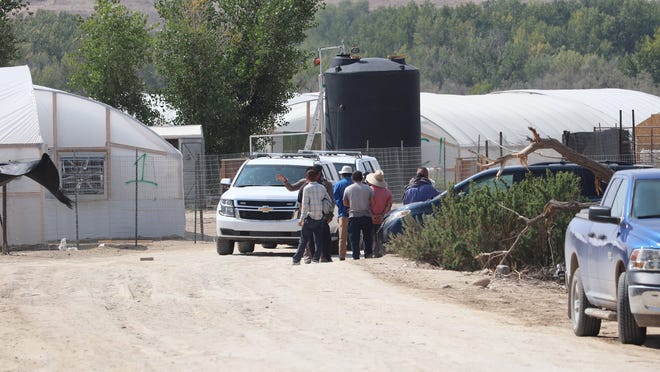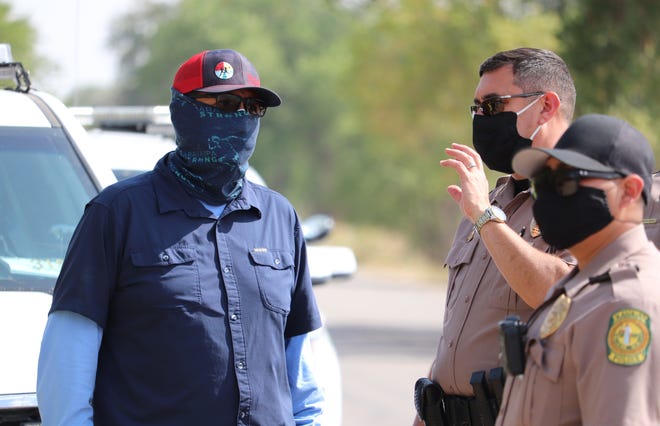Farmers caught up in cannabis crackdown speak against Navajo Nation's bid to take land use permits
Some say they grew hemp, not pot, others say they were mistreated during law enforcement crackdown

- Farmers and supporters spoke on March 30 about reactions by a tribal government board, protesters, and police to hemp farm operations established in and near Shiprock.
- There are 33 farmers named in a civil complaint filed by the Navajo Nation in October, which alleges they violated tribal law by growing hemp and marijuana.
- Navajo Police Chief Phillip Francisco said the department has not received any complaints about misconduct or mistreatment by officers.
HOGBACK — Farmers entangled in last year's illegal cannabis operations on the Navajo Nation say their voices have not been heard by the tribal government and denounced actions to nullify their farming permits.
"The Navajo Nation response to the hemp farmer is wrong and unnecessary. … The farmers' truth and experiences have not been heard by our tribal government," Hogback resident Sherrell Mesa said.
Mesa joined fellow farmers and supporters who spoke on March 30 about reactions by the tribal government, protesters, and police to hemp farm operations established in and near Shiprock.
The activity was finally shut down when several law enforcement agencies executed federal search warrants from Nov. 9 through Nov. 11 on farms suspected of growing cannabis plants in greenhouses – the farmers insist they were producing hemp while the tribal government and tribal and federal agencies have stated it was marijuana.
Navajo law was amended in the middle of last year to classify both types of the cannabis plant illegal on the tribal land.
Mesa is among 33 farmers named in a civil complaint filed by the Navajo Nation in October, which alleges they violated tribal law by growing hemp and marijuana.
The tribe's judicial branch, department of justice and outside legal counsel, Charlie Galbraith, did not respond to an inquiry about the case.
New Mexico approves recreational marijuana:What to know about the Cannabis Regulation Act
Farmers fear losing land use permits
In Mesa's remarks, she criticized the March 16 decision by the San Juan River Farm Board to recommend that the Bureau of Indian Affairs revoke agricultural land use permits issued to the farmers.
Those permits have been handed down from generation to generation, several farmers explained.
"Punishing the farmers without a crime, no charges or no evidence of a crime and intentionally preventing them from making a living, the Navajo Nation government has overstepped its authority and violated the farmers rights," Mesa said.
Jean Jones has lived on her entire life on her family's farm in Hogback.
The 80-year-old wiped tears from her face while talking about potentially losing her land use permit.
"I'm worried about that. I don't want that to happen," Jones said.
Farm Board chairperson stands firm
Farm Board Chairperson Tracy Raymond and Vice-Chairperson Bea Redfeather confirmed the board's decision.
Raymond explained the affected parties are being notified about the recommendation and no permits have been revoked at this time.
"My personal opinion is they were growing illegal cannabis and they need to be held accountable for their actions," Redfeather said.
Redfeather has previously spoken out against the cannabis plant operations, citing the need to keep community members safe.
Growing operations came to the attention of the tribal government after community members raised concerns about the farms that were developing rapidly under the direction of Dineh Benally. He faces civil and criminal cases in tribal court stemming from the matter.
Searchlight New Mexico reported that at the peak of the operations, more than 1,000 Chinese Americans and Chinese immigrants were employed on the farms, and law enforcement agencies seized more than 60,000 pounds of marijuana in their November raid.
New Mexico's legal cannabis bill clears last hurdle:Heads to Gov. Michelle Lujan Grisham
Some say they were mistreated
Jacqueline Foster lives on a farm with her parents.
In her comments, she said she witnessed "wrongdoings" by neighbors and mistreatment by police officers toward her family.
"I've seen the cops point guns at my kids and I've seen cops arrest my parents for things they have no idea of what they have done in the fields," Foster said adding the Chinese Americans and Chinese immigrant workers were "good people."
Despite farms ending cannabis plant cultivation last year, Foster and others said the harassment continues by those who oppose such operations.
For Foster, the most recent incident happened when she was removing discarded plastic bags from the field and a pickup truck stopped, then a man used binoculars to watch her.
"All these farmers are good people. They're not bad people. They didn’t deserve to get treated this way. All they wanted was change. What's wrong with change?" Foster said.
Others who shared their experience with law enforcement in November included Terry Pettigrew. He said that a state police officer pointed an assault rifle at him before he was handcuffed outside his home.
"I thought, is this the day that I'm going to be killed? I'm I going to die this morning," Pettigrew said.
He, like others, said the police action has traumatized him.
Cops, feds say operation was by the book
The FBI led the multi-agency operation in November, which took place at 21 farms and two residences.
FBI spokesman Frank Fisher said in a statement that the agency worked with federal, state, local and tribal partners to conduct the court-authorized operation while ensuring the safety of the public.
"This joint operation resulted in the eradication of significant quantities of marijuana, preventing the drug from reaching communities on the Navajo Nation as well as other parts of the country, and enforcing tribal and federal law," Fisher wrote.
He added that since this is an ongoing investigation, additional information cannot be released at this time.
Arrested for marijuana in New Mexico?:Here's what to know about the state's expungement bill

Navajo Police Chief Phillip Francisco said the department has not received any complaints about misconduct or mistreatment by officers.
If any are filed then they will be investigated, he said.
He added that during the time the farms were running, officers responded to calls from community members regardless if they were for or against the growing operations.
"I will say that during the operation, all the officers were mandated to wear their body cameras and them running – not just Navajo police officers but all the officers involved," Francisco said about the joint law enforcement effort in November.
Noel Lyn Smith covers the Navajo Nation for The Daily Times. She can be reached at 505-564-4636 or by email at nsmith@daily-times.com.
Support local journalism with a digital subscription to The Daily Times.